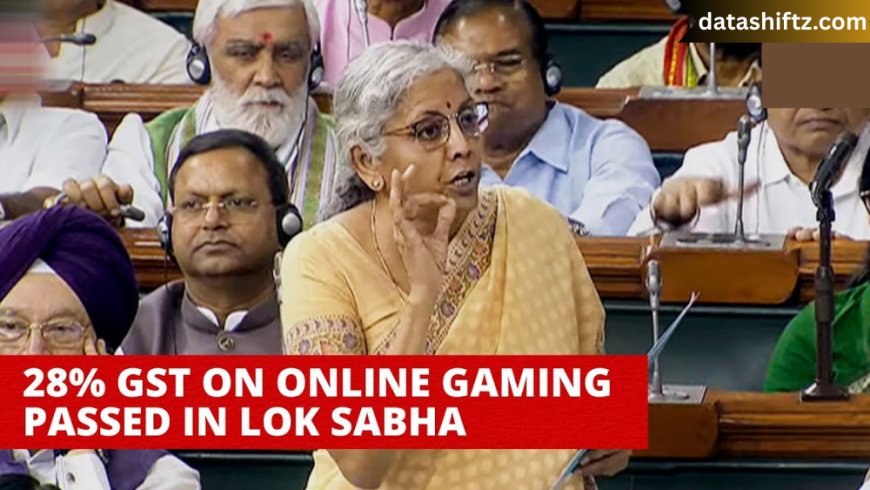Online Gaming Bill in Lok Sabha: A Comprehensive Overview

Introduction
In recent years, the booming online gaming industry in India has attracted attention not only from millions of gamers but also from lawmakers and regulators. With the sector's exponential growth and increasing revenue generation, the Indian government has felt the need to regulate this space more effectively. The Online Gaming Bill, recently introduced and discussed in the Lok Sabha, aims to create a comprehensive legal framework governing online gaming, including fantasy sports, real money games, and esports.
This blog post explores the origins, key provisions, implications, and debates surrounding the Online Gaming Bill in Lok Sabha. We will also discuss its impact on players, companies, and the broader digital economy.
Background and Need for the Online Gaming Bill
Growth of Online Gaming in India
India’s online gaming market has witnessed unprecedented growth, fueled by affordable smartphones, improved internet connectivity, and increasing youth participation. According to industry reports, the sector was valued at over USD 2 billion in 2023 and is expected to cross USD 5 billion by 2027.
With millions actively engaging in games involving skill and stakes, concerns have also emerged about:
-
Addiction and mental health impacts
-
Financial risks due to real money involvement
-
Lack of clear regulatory guidelines
-
Data privacy and cybersecurity challenges
Existing Regulatory Scenario
Before this Bill, the online gaming industry operated under a patchwork of laws, such as:
-
The Public Gambling Act, 1867 (outdated and not suited for digital platforms)
-
State-specific laws with varying interpretations on betting and gambling
-
Consumer Protection Act, 2019 (addressing fairness but not comprehensive)
-
Information Technology Act, 2000 (for data security)
The absence of a unified national law led to legal uncertainties, hindering investment and innovation in the sector.
Key Provisions of the Online Gaming Bill
Definition and Scope (Heading 2)
The Bill defines online gaming broadly, covering:
-
Skill-based games
-
Real money games (where users wager money)
-
Fantasy sports
-
Esports tournaments
It clearly distinguishes skill games from pure chance games, attempting to exempt the former from gambling restrictions.
Licensing and Regulation
One of the core aspects of the Bill is the establishment of a central regulatory authority responsible for:
-
Issuing licenses to online gaming operators
-
Monitoring compliance with operational and ethical standards
-
Ensuring fair play and transparency in games
-
Implementing anti-addiction measures and player protection protocols
Consumer Protection Measures
The Bill mandates:
-
Age verification (minimum 18 years)
-
Responsible gaming limits (daily/weekly spending caps)
-
Clear disclosures of game rules, odds, and prize structures
-
Grievance redressal mechanisms for players
Data Privacy and Security
Online gaming platforms must adhere to strict data protection standards to safeguard user information and prevent misuse.
Implications of the Online Gaming Bill
For Players
-
Enhanced protection from fraudulent games and scams
-
Access to transparent gaming environments
-
Restrictions on underage participation
-
Potential limitations on gambling-related harms
For Online Gaming Companies
-
Requirement to obtain licenses and pay regulatory fees
-
Compliance with transparency and data security norms
-
Increased operational costs but greater legitimacy
-
Opportunity to attract institutional investments with clear regulations
For the Economy and Digital Ecosystem
-
Boost to the formal economy by curbing illegal gaming
-
Growth of esports and fantasy sports markets
-
Employment generation in tech, content, and customer service sectors
-
Enhanced tax revenues for the government
Debates and Criticisms Surrounding the Bill
Skill vs. Chance Debate
One of the most contentious issues is how to distinguish games of skill from those based on chance. Critics argue the Bill’s definitions may blur the lines, affecting games like poker, rummy, and fantasy sports differently across states.
Impact on User Freedom
Some believe the Bill could overregulate, restricting the freedom of adults to engage in gaming activities of their choice. Others warn it may limit innovation by imposing stringent compliance requirements on startups.
Enforcement Challenges
Ensuring compliance across thousands of platforms and millions of users is a logistical challenge. There are concerns about regulatory overreach and implementation efficacy.
Comparative Table: Key Features of the Online Gaming Bill
| Feature | Description | Potential Impact |
|---|---|---|
| Definition of Online Gaming | Covers skill games, real money games, fantasy sports, esports | Clarifies regulatory scope |
| Licensing | Central authority issues licenses, regulates operators | Formalizes market, increases compliance |
| Age Restrictions | Minimum age limit of 18 years | Protects minors |
| Responsible Gaming | Spending limits, time limits, addiction awareness campaigns | Reduces gambling-related harm |
| Transparency | Disclosure of game rules, odds, and prize details | Builds consumer trust |
| Data Protection | Compliance with data privacy laws and cybersecurity standards | Safeguards user information |
| Grievance Redressal | Mandatory complaint handling mechanisms | Improves player confidence |
| Penalties | Fines and license suspension for violations | Ensures accountability |
Benefits of the Online Gaming Bill
-
Promotes Responsible Gaming: Implements safeguards to protect vulnerable users.
-
Clarifies Legal Ambiguity: Creates a unified legal framework applicable across India.
-
Boosts Industry Growth: Encourages investments and innovation with clear rules.
-
Protects Consumers: Ensures fairness, transparency, and grievance redressal.
-
Enhances Tax Revenue: Brings unregulated platforms under the tax net.
-
Improves Data Security: Safeguards player data from misuse and breaches.
-
Encourages Skill Development: Supports esports and skill-based competitions.
-
Creates Employment: Generates jobs in gaming, IT, marketing, and regulation sectors.
Conclusion
The Online Gaming Bill presented in Lok Sabha marks a pivotal moment for India’s fast-growing digital gaming industry. While it aims to balance consumer protection with industry growth, the Bill’s success will depend on careful implementation and regular review to adapt to emerging technologies and gaming trends.
By formalizing regulations, the government hopes to build a safer, fairer, and more transparent online gaming ecosystem—one that empowers players, fosters innovation, and ensures the sector’s sustainable development. For stakeholders, including gamers, operators, and policymakers, staying informed and engaged with the Bill’s provisions is crucial to shaping the future of gaming in India.





























